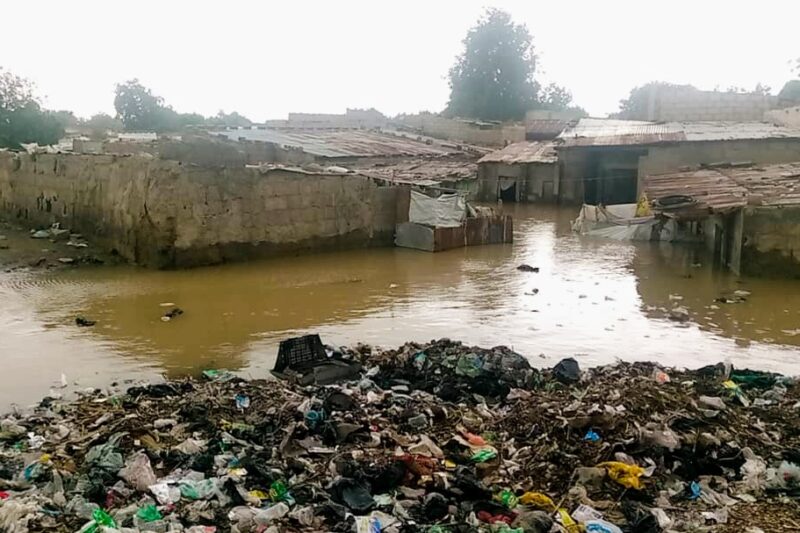Residents – who have been ordered not to rebuild or renovate their houses along the riverbanks – fear they will end up on the streets if the government does not compensate them.
The Borno State government has no plans to compensate homeowners whose houses on riverbanks will be demolished to prevent another devastating flood such as the one last month that engulfed more than half of the capital, Maiduguri, and its environs.
Disappointed homeowners told RNI that they should be compensated because they had bought their houses with hard-earned cash and did not have anywhere else to go.
If they did not get compensation, they said, they would end up without a roof over their heads and would probably have to live on the streets.
On Friday, September 27, more than two weeks after the devastating flood, the Borno State Urban Planning and Development Board issued an urgent notice warning residents whose properties are on the riverbanks that they were not allowed to rebuild or renovate their flooded homes.
Now, the government has disclosed that it intends demolishing more than 1,300 houses on the banks of the river – even those that are still standing – to prevent a recurrence of the flood and the destruction it caused.
About two million people were affected by the flood. Houses in low-lying, flood-prone areas were submerged. More than 400,000 people were displaced.
The flood started in the early hours of Tuesday, September 10, when the Alau Dam began overflowing.
It caused massive destruction. Thousands of homes were submerged, as were government offices, bridges, roads, hospitals and other critical infrastructure.
The death toll – expected to be high – has not yet been released.
This week, the government officially requested that residents living near riverbanks relocate to safer, high-lying areas before demolition commences.
Residents are alarmed and say that if they are not allowed to rebuild or renovate their homes, they should be compensated.
Sale Suleiman, who has a house in the Gwange area of Maiduguri, told RNI that the government should support everyone who has a house in riverine areas.
“I have lived in the Gwange area near the riverbank for years – long before my house was submerged and destroyed in last month’s flood. Right now, I am taking refuge in one of the schools that was allocated as a temporary shelter for displaced persons. My wife and I have been waiting for the water to fully subside before we return to our house.
“Before the government issued the declaration that it was going to demolish our homes, I had already planned to rebuild and renovate my house. Now the government says that no one will be allowed to reconstruct their homes. Even if the house is still standing, it will be demolished.
“This is extremely bad news for poor people like us. Where are we supposed to go? We bought our homes with hard-earned money. If the government is going to demolish our homes, then it should at least give us a plot of land so that we can start again.
“I hope the government will reconsider its decision and support those of us who live close to the river. If not, many of us will be homeless.”
Hadiza Mukhtari’s home is in the Gada Bakwai Gwange area of Maiduguri. She told RNI that her husband is blind and she has three children.
“If the government demolishes our house, we will have no place to go.
“My husband bought the house and we have been living here for many years. We have had to vacate the house often in the rainy season because the river overflows its banks. But we have never experienced a flood as devastating as this year.
“I understand why the government does not want people to live close to the river but it is the only place we have. We cannot even afford to rent a place, let alone buy a plot of land and build another house.
“I am appealing to the government to assist us. We just want to be treated with dignity. If the government gives us some land, we would be happy to live in a tent until we can afford to build a house. We just don’t want to be left homeless. No one wants to live on the streets.”
Liman Gana Mustapha, the general manager of the Borno State Urban Planning and Development Board, told RNI that it was necessary for the government to put in place measures to prevent another devastating flood which was why it had ordered the demolition of properties on the riverbanks.
Some of the settlements that would be affected included Galtimari, Fori, Kaddamari, Behind Forestry Quarters, Sakwari or Shokari, Behind Chad Basin, Gwange, Bulabulin and Sabin Gari.
“Last week, the Borno State government – under the auspices of the Borno Geographic Information Service – said that at least 1,300 houses along waterways and river banks had been earmarked for demolition.
“We warned residents not to return to their homes or to start renovating or rebuilding their structures that were destroyed in the flood.
“For now, the state government has no plan to compensate those whose houses will be demolished.
“When the demolition starts, the government will look into it. If there’s a need to support homeowners, the situation might change. But, for now, there is no plan to compensate residents.”
SHETTIMA LAWAN MONGUNO









